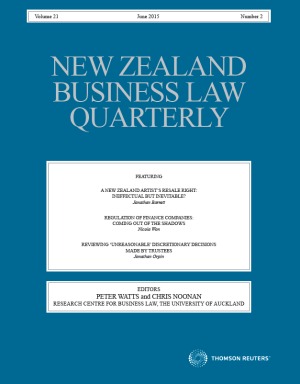New Zealand Business Law Quarterly Update
The New Zealand Business Law Quarterly (NZBLQ) Volume 21 Number 2, June 2015 has recently been released.
It contains three articles. Their titles, authors, and an abstract are below.
1. A New Zealand Artist’s Resale Right: Ineffectual but Inevitable? by Jonathan Barrett, Senior Lecturer, School of Accounting and Commercial Law, Victoria University of Wellington
The concept of droit de suite (right to follow), which was first introduced into French law in 1920, has more recently been adopted by various common law countries as an artist’s resale right (ARR). An ARR scheme allows artists to share in the proceeds from the resale of their artworks. New Zealand introduced an ARR Bill in 2008 but it was discharged in 2009 by the recently elected government. Nevertheless, the issue remains pertinent. Australia, New Zealand’s closest trading partner, introduced an ARR scheme in 2010 and both China and the United States are considering droit de suite.
This article examines the concept of droit de suite and considers whether New Zealand should revisit an ARR scheme. Despite strong economic arguments against droit de suite, it is concluded that New Zealand may need to reconsider its position in order to maintain its reputation as a jurisdiction which respects intellectual property rights, and to harmonise this area of intellectual property law with its major trading partners.
2. Regulation of Finance Companies: Coming Out of the Shadows by Nicola Won, Editor-in-chief Company and Securities Law, CCH NZ, Auckland
Article abstract
The reforms to the regulation of finance companies and other non-bank deposit takers over the past seven years have resulted in prudential regulation of the sector and were considered necessary following the finance company collapses between 2006 and 2011. This article examines the resulting regulatory framework and the roles of the regulators and the statutory supervisors. The underlying rationale for prudential supervision is also discussed with reference to New Zealand reviews and the work of the Financial Stability Board and Australia’s regulators. The conclusion is that although prudential regulation was needed, the regulatory structure is overly complicated and direct supervision by the Reserve Bank is proposed as a more efficient model. This article also considers the corporate governance reforms that address issues of management of related-party transactions and poor decision-making by finance company boards. It is concluded that these new laws should be supplemented by regulatory guidance and close co-operation between the regulators and trustees (supervisors) in the event that supervisory action is required.
3. Reviewing ‘Unreasonable’ Discretionary Decisions Made by Trustees by Jonathan Orpin, Barrister, Wellington
Article abstract
It has been said that it is an open question whether New Zealand law allows for judicial review of a trustee’s discretionary decisions on the ground of reasonableness (by analogy with public law). This article considers the current state of the law and asks whether the courts’ role should be developed by reference to public law principles, in particular the post-Wednesbury approach of adopting variable degrees of deference to decision-makers. It concludes that the law does not presently allow for review on the grounds of reasonableness and that it is neither necessary nor appropriate for trust law to follow the approach taken in public law.
About NZBLQ
The New Zealand Business Law Quarterly (NZBLQ) is New Zealand’s leading business law journal. It is a joint venture between the Research Centre for Business Law at The University of Auckland and Thomson Reuters NZ. The NZBLQ aims to provide in-depth, but accessible, analyses of business law issues for both a national and international legal audience. It is a fully refereed journal, with material submitted by academics, from New Zealand and abroad, and by practising lawyers. Published four times per year, it is available in hard copy and online.
For more information
- Visit our estore: New Zealand Business Law Quarterly (NZBLQ)
- Or talk to your account manager or call Customer Service 0800 10 60 60
